"For all our sakes, wake up."
Our foreign policy can now be modeled by a random walk.
Today marks two years since Russia’s unprovoked, full-scale invasion of Ukraine.
Even if Mike Johnson relents and allows the House to vote, the damage done to the United States isn’t recoverable. The whole world now knows, beyond all reasonable doubt, that the United States has gone so bug-crazy that you can’t even count on us to act out of an animal sense of self-preservation, still less “enlightened self-interest” or upholding our word or acting on our principles.
No rational country could predicate its national defense on an alliance with this kind of United States. And no rational country will.
We’ll watch the consequences of this realization play out over the coming decade, whether slowly and agonizingly or all at once, and we will learn again, the hard way, why Americans once painstakingly constructed the world order in which we’ve so long been snugly nested—one so innocent of war that Americans now sincerely argue, bless their hearts, that being “invaded” by low-cost landscapers and berry-pickers from Central America is just like being invaded by Russia in the largest combined arms operation since the Battle of Berlin.
Crazy is the key word, because there is no coherent ideology here, no vision, no plan, nothing to which you can hold on at all. Don’t try to find method in it, you won’t. Our foreign policy can now be modeled by a random walk. We’re pursuing no definable objective. What we do and the external world are in no wise connected. The things we say to explain our decisions are meaningless, from the syntax to the phonemes. Anyone who pretends to see a logic in it is kidding himself.
“If there is a Mike Johnson plan, there aren’t any House Republicans that are aware of its existence.”—a GOP lawmaker, granted anonymity to speak freely, to CNN.
It seems that it’s possible for a once-stable pillar of the international state system somehow to break—flashing and beeping stupidly like a jammed copy machine or a broken coffee maker—while its allies are slaughtered, its alliances sundered, and its power undone. We don’t mean ill, I’m sure. Could it be a bad line of code? Have we tried turning ourselves off and on again? It’s a hell of a time for us to go on the fritz, though, because while our government beeps and blinks and turns in circles, a decent world order built by our grandparents’ blood, toil, tears and sweat is being supplanted by a Hobbesian hell of war, terror, savagery, and starvation.
For no reason at all! We could stop this! One man could stop this! Mike Johnson just needs to let the House vote. How could it be that this nebbishy, featureless little dweeb—someone we’d never even heard of until a few months ago—has become the hinge of history and one of its greatest villains?
Congress is on vacation. On vacation! Nothing urgent for them to be back in Washington—why, it’s just the flame of the American Revolution and the hope it represents to the world being extinguished as humanity’s future’s consigned to a pack of scoundrels, thieves, kidnappers, torturers, rapists, monsters, and murderers while American power is eclipsed, its honor tarnished, its friends are murdered and its enemies rejoice—it’s not so bad, you get used to it after the first few times, you know?—midwifing a world in which a boot stamps on the human face, forever. And why? For no reason at all! Just—because.
Mike Johnson doesn’t feel it necessary to recall the Congress or even to explain himself. I don’t even know why he thinks he’s doing this. Because Trump said so? So people say, but who knows? We don’t even know the Party Line. I’ve looked everywhere for a statement from him. I’ve called his office over and over. All he’s told us is that Congress went on vacation because we haven’t secured our southern border—a non sequitur so absurd it could be a line from the script of a surrealist art film about a general, his wife, a clergyman, and a talking donkey—and he apparently told Republicans, before sending them off to their holiday redoubts, that there’s “no rush” to get weapons to Ukraine, after proposing they discuss it at next month’s House GOP retreat.
Very seriously, does he have all his marbles? In all the excitement about whether Biden or Trump is more demented, has anyone asked if Mike Johnson has some kind of cognitive impairment? How else can you explain the words “no rush?” Desperate European leaders, the NATO secretary-general, the joint chiefs, a parade of national security advisors—they’ve all been lined up outside his office to explain that yes, there is a goddamned rush. Beyond the world of Donald Trump, JD Vance, Tucker Carlson, and Elon Musk, every adult—on both sides of the aisle—grasps that Putin’s victory would be a disaster and a catastrophe, and the growing prospect of it is an unmitigated emergency. Huge, bipartisan majorities of Americans support sending that aid to Ukraine. Only one group doesn’t—those defined in this poll as “Trump Republicans”—and they make up a mere 13 percent of the electorate. Even they don’t oppose it strongly: Four out of ten Trump Republicans do support it. The number of Americans opposed to saving Ukraine can be measured in the low single digits. Yet Mike Johnson says there’s “no rush” to allow our democratically-elected representatives to vote. Why?
When things make no sense, the mind reaches for conspiracy theories. But they make no sense either. No, I don’t believe that at the end of the movie the camera cuts to Johnson greeting his handlers in his native Muscovy as they place a medal around his neck and declare him a Hero of the Russian Federation. It’s simpler and more plausible to think that Mike Johnson is just out of his ever-loving faceless-dweeb mind. There are a lot more lunatics in the world than there are sleeper agents.
People go nuts. It happens. Look, Mike Johnson suddenly found himself—through serendipitous, improbable, unexpected and certainly undeserved fortune—the world’s most powerful man. Surely it’s as much an astonishment to him as to the rest of is. It must be disorienting for a man whose own wife probably has trouble recognizing him in a crowd suddenly to hold the future of humanity in the palm of his hands. Perhaps he’s so stunned that he wants to savor it a bit. These are his fifteen minutes, after all. Yes, damn the consequences—he’s just going to sit there in his favorite easy chair and take a good long vacation while the Ukrainians beg for their lives. “They underestimated Mike Johnson,” he’s muttering. “They mocked Mike Johnson. They called him ‘weird’ because he uses an app to monitor his son’s porn. Well, look who’s mocking now! You sophisticated Estonians thought you were better than Mike Johnson? You Lithuanian sluts thought you could kick Mike Johnson around? Oh-ho! It’s payback time. Beg for your lives, wretches! Dance!”
He’s probably lighting up a cigar and firing up the OnlyFans right now.
It could be said of Chamberlain, at least, that “he acted with perfect sincerity according to his lights and strove to the utmost of his capacity and authority, which were powerful, to save the world from the awful, devastating struggle” that came nonetheless. What can be said of Mike Johnson? Sincerity? Capacity? Authority? These words are a category error—it’s like praising the wisdom of a toaster.
No, he’s doing this just—because.
Notes on the news
Here are articles about the situation that seemed to me worth reading:
Two years after Russia launched its full-scale attack to annul any remnant of an independent Ukraine, Putin’s genocidal intent is now impossible to deny:
… In November, human rights investigators revealed new evidence charging the Kremlin with an intentional starvation crusade which appears to have been planned prior to the invasion. … Other components of Putin’s strategy are parts of his genocidal campaign, including the blocking of Ukraine’s Black Sea ports, destroying Ukraine’s granaries, planting landmines under the world’s most fertile farmland and targeted killing of Ukraine’s top farmers. …
Russia’s acts of brutality obscure the lines between past and present. Since the invasion, the eastern city of Kharkiv has been bombed incessantly. Residents have lost parents, husbands, children, jobs and homes. Kharkiv was also horribly affected during the Holodomor, experiencing dreadful suffering. Entire villages died out with people scared to death of hunger, fearing for their children, victims of an artificial famine.
These days, numerous Western leaders maintain that Putin cannot be permitted to replicate Stalin’s crimes. However, Ukrainian President Volodymyr Zelensky’s pleas for more extensive aid to oust Russian forces and finally stop this cycle of violence are not being fully answered. Ninety years after the Holodomor, Western leaders have the occasion to institute life-saving retribution to the Ukrainian people who are fighting both the memories and vicious realities of two Kremlin dictators.
Cameron and Sikorski: Failing to stand with Ukraine will remake the world as we know it:
This war is the biggest test of our generation. A wholly unprovoked invasion. A blatant threat to our collective security. The clearest example of one country trying to extinguish the independence of another. Other adversaries are watching to see how we respond. Will we stand with Ukraine? Will we stand up to Putin’s naked aggression? The consequences of failure won’t just be felt in Ukraine—they will remake the world as we know it.
I scribbled some thoughts about what I believed were Putin’s strategic objectives in invading Ukraine (see chart). In the First 18 months of the conflict, Ukraines’ action, NATO collaboration, and US support caused him to fail. We’re at an inflection point.
Addressing each:
Zelenskyy is still strong
Ukraine’s army is still fighting
Ukraine’s population is resilient
Russia does not control the Black Sea ports
The West—especially the US—has returned to being divided, and NATO may now take fewer risks.
Putin now knows that Ukraine’s continued capability will—for the short term—continue to require support from the West. So he is pulling out all stops, with mobilizations (over 400,000 new—untrained—soldiers as “meat” for attacks), a ramped up industrial base, and oppression. A mostly unified US during the first 18 months is now wavering and increasingly divided, mostly due to actions by a wannabe US authoritarian (and his cult) who for whatever reason support the murderous, criminal Putin. This is stalling US aid, which has multiple effects.
What effects? On the battlefield, supply lines are the operational center of gravity. If disrupted or halted, the effects are disastrous. And that’s when an army has great logistics chain. Due to the hodgepodge of weapons and lack of prep, UAF does not have that ... yet. Russia has learned that they can take a position through continuous artillery barrages and sending thousands of soldiers to their death. Their artillery attacks have slowed, but they are still massive. They’ve also become better at coordination between units. Russia is attacking at multiple locations simultaneously—Avdiivka, Maryinka, Kreminna, Bakhmut, Kreminna—and the UAF is being stretched thin and low on supply.
What is a tactical withdrawal is also a sound operational maneuver by Gen. Syrskiy. He’s hoping for resupply. But in going on the offensive, Russia is taking a risk. They’re not very good at maneuver, their supply lines are non-existent, and they open themselves up for increased attrition when moving.
But here’s the thing ... if the UAF doesn’t get prevision artillery, more air defense ammo, and mobilize more forces, they will be at a disadvantage. They will likely lose more ground, but they must limit those losses and unnecessary attrition of their forces and population.
Going back to Putin's strategy ... his goals were to “further divide NATO and the US.” I believe NATO has grown stronger ... stronger than they’ve been at any time during my years serving in Europe. But they’re also concerned. Especially the newer NATO members. They know Russia, and they’re guessing they might be next. Especially a few who have been most supportive of Ukraine: Poland, Romania, Estonia, Latvia, Lithuania. They believe they would be next in Putin's crosshairs, for asymmetric attacks or even kinetic strikes. Here’s where it gets sporty: There have been many who say “give Ukraine everything they ask for!” But as I’ve said so many times, it doesn’t work that way. Nations consider their own security requirements, weigh risks, and then provide what they can. In my view, the Ramstein conferences—led by the Secretary of Defense—have been masterful in getting nations to take risks, dig deep, supply ammo and arms that they have available ... and then some. In my view—contrary to many—contributing nations have been phenomenally generous.
Now, considering an increased Russian threat and the performance by the US Congress, will some NATO nations take fewer risks? Provide less equipment and ammo? Become more concerned with their own safety above the collective NATO alliance? Trump’s comments certainly didn’t help!
Putin has become emboldened. I believe he thinks the tide is turning. Navalny’s death—and the suppression of the Russian population—have shown this to be true.
The US could turn this all around and possibly affect Putin’s election by delivering the package many Americans want.One man stands in the way.
Bring it to the floor for a vote, Speaker Johnson.
Stop being a tool of Putin’s best friend.
Here’s a good conversation with Yaroslav Trofimov, the Wall Street Journal’s Ukraine correspondent. Offer it to your friends whom Putin convinced, for example, that Boris Johnson queered a viable peace deal:
US Republicans blocking aid. European right-wingers pushing to abandon Kyiv. Ultra-cautious leaders. What is the West’s real strategy?
As Kyiv and its allies contemplate a gruesome menu of possibilities for the coming year—including an all-fronts push by Russia’s allies, Iran and China, to trigger World War III—it’s worthwhile to pause for a moment and ask: How did we get here? How did the West, with its aircraft carriers and combined economic footprint approaching €60 trillion (dwarfing China, Iran and Russia combined) cede the initiative to a shrinking, post-Soviet country with the GDP of Spain, and end up in a defensive crouch flinching at the next affront from Putin? And if repelling Putin’s invasion of Ukraine isn’t the West’s real objective—what is? …
… Beyond fear, diplomats and experts pointed to the dynamic between Scholz and Biden as a driving force behind the West’s overriding strategy of incrementalism and escalation management, rather than a focus on strategic outcomes, in dealing with Ukraine. Despite a 16-year age difference, both men came of age politically during the Cold War and its widespread fears of nuclear armageddon. Both are deeply wedded to the US-led international order and NATO protections for Europe. Both are men of the left who are instinctively suspicious of armed intervention and, temperamentally speaking, risk-averse and uncomfortable with geopolitical gamesmanship, experts and diplomats argued. …
Experts also pointed to the key role of advisers, namely US national security adviser Jake Sullivan and Scholz’s advisers Schmidt and Jens Plötner, a foreign policy adviser, in shaping their bosses’ approach. Diplomats and experts consulted for this article described Sullivan as being “highly intelligent,” “not deeply experienced on national security,” “ultimately career-driven” and “a bit short on emotional intelligence.” Schmidt gets “inseparable from Scholz,” “very cautious,” “basically terrified of Russia,” “not as big a foreign policy expert as he thinks he is.” Plötner, in turn, is described as “a super close confidante,” “Russia-friendly,” “unconvinced by the narrative that an attack on Ukraine is an attack on all of us.”
“Together these two [Sullivan and Schmidt] engineered the idea that Russia would eventually get ground down and be discouraged,” said Hunter Christie. “That may have avoided nuclear war, but it has trapped us between two suboptimal outcomes: a bigger war with Russia or the collapse of Ukraine, which would be a shock and a humiliation and a demonstration of Western weakness.” …
… Having squandered an opportunity to equip Ukraine’s forces with air power during the early months of 2023—a key factor in the failure of a much-touted counteroffensive—Western leaders now see their hands increasingly tied by politics: The US presidential election and Donald Trump on one side; the European Parliament election and the rise of right-wing forces led by Hungarian Prime Minister Viktor Orbán on the other. Critics warn that the window of opportunity for the West to help Ukraine turn the tide is, if not already closed, closing.
Yet there is still time and the basket of options is far from empty. As the reports on ATACMS and Taurus suggest, Western leaders are still able to deliver game-changing weapons to Ukraine if the incentive is strong enough (in this case, officials say deliveries could be justified by sending Putin a “Navalny signal” following the opposition leader’s death). But the deliveries aren’t a done deal, and other possibilities—including confiscating Russian assets, taxing Western companies that continue to operate in Russia, or stepping up sanctions against Putin’s regime—remain on the table, visible to all, yet undeployed. Even after Navalny’s killing, there has been no “Mario Draghi moment” signaling resolve to do “whatever it takes” to help Ukraine prevail, added Techau.
(I think his analysis is well-constructed and probably correct.1)
Trump owes Americans some answers on foreign policy. If the former president intends an historic redefinition of US leadership in a world of aggressors, he should tell the voters:
The people of Ukraine themselves must be starting to feel like the gladiators who fought in a walled colosseum to entertain the Romans. They await a thumbs up or down on their fate from Mr. Trump. So which will it be, Mr. Trump—let Ukraine defend itself, or let it go?
Mr. Trump has refused to debate GOP primary opponent Nikki Haley, arguing that he doesn’t need to put his lead at risk. It is not acceptable, though, for Mr. Trump to deny American voters a more concrete idea of his policies toward Ukraine or the world’s other concurrent troubles. For starters, what did Mr. Trump mean when he said he could end the war between Russia and Ukraine in 24 hours? Does he in fact mean Mr. Putin should be allowed to annex eastern Ukraine? Would he withdraw the US from the roughly 50-nation Ukraine Defense Contact Group? Would he cede Russian-speaking areas of the Baltics to Mr. Putin? I would ask Mr. Trump if he thought the Munich Agreement was a mistake in 1938, or just poorly negotiated. …
Mr. Trump may yet instruct House and Senate Republicans to end support for Ukraine. That would be a historic redefinition of US leadership in a world of aggressors. If so, Mr. Trump has an obligation to tell American voters why 2024 won’t be another 1938.
(Who’s he kidding? Ask Trump for his assessment of the Munich Agreement? This guy?☟)
Europe can no longer count on America’s security umbrella. Trump is undermining its safety and the Continent must respond:
… If Trump is not colluding with Russian President Vladimir Putin, he is undoubtedly serving his interests … Europeans have to start thinking the unthinkable: how to plan for war without America.
Trump’s pronouncement, inviting Russia to attack NATO, poses an immediate threat to NATO, the US, and American troops, and the damage cannot easily be undone:
Few missed Trump’s invitation to Putin to attack a NATO ally. Unfortunately, too many considered it to be inconsequential political demagoguery and pandering rhetoric for an isolationist base. Some national security experts have sounded alarms warning of a seemingly distant threat of the collapse of the NATO alliance, but these predictions are framed as being contingent on Trump winning a second presidential election ten months from now.
The reality is far more grave. Trump’s pronouncement, inviting Russia to attack NATO, poses an immediate threat to NATO, the US, and American troops. And the damage cannot easily be undone.
The domestic political turmoil in the US and the paralysis in the Euro-Atlantic alliance in conceiving and implementing a strategy for the Russia-Ukraine war resembles some of the key conditions that propelled Putin to launch the 2022 war. Prior to the invasion, Putin perceived American society and the United States’ political decision-making structure to be in disarray. The January 6th insurrection reflected the depth of American political division and throughout 2021, Trump hammered away at his personal narratives that Putin wasn’t a menace, Russia was a potential ally, and Ukraine was the culprit behind tension in Eastern Europe and an enemy. Trump was a former president but remained the leader of a Republican party that was increasingly pliant to whatever extreme position he wished to pursue. For Putin, this capture of the Republican establishment signaled that a swift and successful Russian victory would result in no significant Western backlash.
The same conditions that invited Russia’s decision to attack Ukraine appear again today in the context of NATO. Putin has demonstrated a penchant for war optimism and miscalculation. He may read Trump’s recent signals and interpret the current security environment much like he did in the leadup to 2022. This is a recipe for a dangerous miscalculation and direct confrontation between Russia and NATO.
… More dangerous is the relevance of Trump’s pronouncement to America’s security, today. If the Republican party is prepared to about-face on border security because Trump demands it, Putin may very well interpret the willingness of the Republican Party to about-face on defending NATO. The result would be political paralysis in the United States. Putin may view this as an alluring, fleeting, and unique opportunity that must be exploited to achieve one of his vital long-term objectives.
Consequently, Trump has significantly advanced the possibility of a war with Russia because he alone has eroded the principle of collective defense that undergirds the NATO alliance. This principle embodied in Article V of NATO, the concept that “an attack on one is an attack on all,” successfully warned-off the Soviet Union for generations. Because of Trump’s recent pronouncement, decades worth of collective defense is in doubt. Vladimir Putin has stated that one of his paramount objectives is the destruction of NATO, he may soon be willing to exploit the chaos and accept Trump’s invitation test the resolve of NATO.
As Russia is bogged down in Ukraine with limited resources for a large-scale confrontation with NATO, this would likely be a limited strike. For instance, Russia can attack to seize a land corridor between the Russian exclave of Kaliningrad and Belarus across Lithuania’s Suwalki Gap. This is the exact scenario that the US government fears most and assesses as the likely flashpoint for a confrontation between Russia and NATO. …
The combination of failed policies to deter Russian aggression across multiple administrations, the Biden administration’s indecisive response to the Russia-Ukraine war, and Trump’s invitation for Russia to attack NATO have all greatly eroded deterrence. With Trump’s invitation to attack NATO, Trump’s influence over the Republican Party creating paralysis and Putin’s penchant for miscalculation and opportunism we now face uniquely dangerous risk of a confrontation with Russia.
We are entering a particularly dangerous moment in US-Russia relations. Decisive action is essential. A bipartisan effort to signal NATO is sound and collective defense is ironclad must be implemented immediately. Putin must be disabused of any perceptions that the US would fail to act to defend NATO. And the House must immediately return to congress and the GOP must pass the National Security Bill carrying US$60 Billion in aid to Ukraine. Rather than relying on appeasement and the prospects of “cooperation” with Russia, American policymakers must show that the United States is willing to stand by our defensive alliances. Failure to do so will not only see the death of deterrence, it would invite disaster.
This is correct.
In early 2021, when Alexey Navalny was getting ready to return to Russia just five months after being poisoned with a Novichok nerve agent, Christo Grozev asked Navalny’s wife Yulia whether she realized that her husband would face certain arrest when his plane landed in Moscow.
“In response, she just smiled and said, ‘Christo, you’re so naive. They won’t just arrest him. They’ll keep him in torture chambers for years. And they might also kill him,’” Grozev told Meduza. …
“I’ve already gotten warnings from my sources that there could be an entire new wave of repressions and murders—that Putin has ‘special plans’ for Russian opposition leaders,” he told Meduza. If these reports are true, he noted, jailed opposition figures such as Ilya Yashin and Vladimir Kara-Murza will be “especially vulnerable” to Putin’s whims.
If you haven’t watched this already, you must:
This, too.
Ice in that woman’s veins.
(Update: Navalny’s body has been released to his mother.)
In 2015, Gary Kasparov published Winter is Coming: Why Vladimir Putin and the Enemies of the Free World Must Be Stopped. I read it at the time. Putin was a menace, he argued, and the United States—and particularly the Democrats under Obama—had appeased Putin so chronically and pathologically as to turn a menace into a monster.
Kasparov wrote of the reckless optimism that gripped the West in the wake of the fall of the Berlin Wall and the West’s failure to appreciate that while the USSR was dead, its security apparatus was alive and its imperial appetites ravenous— humiliation and revanchism having made them only more acute. But the book’s true theme was the erosion of the West’s moral authority, which once had inspired political prisoners during the Cold War and given hope to the oppressed the world around.
Kasparov argued that we had through our indifference and denial encouraged monsters like Putin to flourish, and this was not merely a problem for Russians, for as Sakharov, wrote, “A country that does not respect the rights of its own people will not respect the rights of its neighbors.”
I’d add this. A country that doesn’t care about the rights of its neighbors won’t respect the rights of its own people. If Americans no longer give a damn that Russia is raping and murdering its way through Europe, we’ll soon exhibit the same indifference toward one another. No one can truly believe that human rights are sacrosanct in America but not in Ukraine. You either believe they’re sacrosanct or you don’t. If our foreign policy doesn’t seek to protect and expand freedom and human dignity in the world, we don’t truly believe they’re worth having. If we don’t believe that, we won’t have them.
Kasparov called for the adoption of a global Magna Carta to unite the world’s liberal democracies against its dictators. He urged the West to slam massive sanctions on all the Kremlin’s cronies, arm Ukraine to the hilt, and end its dependence on Russian oil and gas. “Dictators,” he wrote, “only stop when they are stopped.”
The New York Times’ review of the book was odiously smug:
There’s no pretense of nonpartisanship here, no subtlety. … Kasparov fully credits Ronald Reagan for the end of the Cold War and the fall of the “evil empire”—“Lesser problems were left to lesser men”—and he has no doubt that “the world would be a safer, more democratic place today had John McCain been elected” president, or at least Mitt Romney, who called Russia “without question our No. 1 geopolitical foe.” Barack Obama, by contrast, is relentlessly and repeatedly skewered: The president is “reluctant to confront the enemies of democracy to defend the values he touts so convincingly”; he is “busy retreating on every front”; and even when he does seem to be standing up to Putin, the most Kasparov can allow is, “I suppose that doing the right thing for the wrong reason is better than never doing it at all.”
The politicking becomes somewhat tedious, as do the “I told you so” moments scattered through the book: “It is cold comfort to be told, ‘You were right!’ ” Kasparov laments in his introduction. …
Over the years, he laments, he has provided long lists of ways to counter Putin, but “even now, after he has proven my worst fears correct and everyone is telling me how right I was, few of those recommendations have been enacted.”
This is not the place to argue the merits or feasibility of arming Ukraine or cutting Russian gas imports. Nor is there a need to defend President Obama against Kasparov’s crude and baseless insults. The question to be posed is whether even the most aggressive Western stance toward Putin would make him less dictatorial or Russia more free. That change must come from within, and I would have much preferred to hear Kasparov’s take on what must change in Russia and how the Russians might do it. There are plenty of other people to trash Barack Obama.
What a self-satisfied mooncalf. Kasparov was right and is right. Everything he predicted has transpired. We should have listened to him then and we should listen to him now.
The former head of MI6, Sir Richard Dearlove, now has a podcast. He invited Kasparov on the show to discuss Navalny’s murder. Kasparov pointed out (again) that there is no material reason for the West’s inadequacy:
Putin’s strength is the result of Western weakness, because today, unlike in the 70s or 80s, the Free World led by America has overwhelming military and economic advantage. And also political—a lot of people believe in democracy and individual rights. But having military and economic dominance doesn’t bring you automatic victory unless you have political will.
What happened in Russia last year was, actually, it was a moment where part of the elite thought that they had to find a compromise. Prigozhin’s rebellion, to me, was a very clear sign that lot of people inside Russia, before the Ukrainian counter-offensive—which was very frightening, by their standards, because top generals and, I think, people like Prigozhin understood that if America had fulfilled its promises and delivered the weapons that Ukrainians expected, it would be over. The Kerch Bridge, which is the key logistical connection to Crimea, could be destroyed in a couple of weeks if America supplied Ukraine with weapons. [But] 31 tanks? Come on, this is—they sent a hundred tanks to Morocco recently. More than 2,000 tanks are now just collecting dust in the California desert. America had all the resources for the war to be won by Ukraine. So that’s why Prigozhin tried to send this message: “Stop this damned war, you know it’s a big business, let’s go back.”
But what happened afterwards—it failed when Putin saw, and people around him saw, the Free World was not ready to provide Ukraine with all the weapons. Okay, Britain does whatever it can, but it’s probably the only exception in Western Europe. Eastern Europe is trying, but they don’t have the weapons. America? Germany, we don’t want to waste our time even making comments about it. So today, they believe Putin is on the winning side, and also, the Russian economy is a war economy and they benefit. It’s a huge business now. And as for sanctions—okay, be my guest: Sanctions are a gold mine, because all these sanctions are just being evaded, and it’s a huge business!—70 to 80 percent of Russian drones now have Western technology. By the way, made in America—yeah third countries, fourth countries, but at the end of the day the Free World shows no determination to win the war so why not just stick with Putin. Because don’t forget, rising against the dictator like Putin means that you lose use everything, including your head. So why?
Here, the host interrupts to ask Dearlov whether he agrees. Is Ukraine losing owing to the failure of Biden and the West, to the Free World’s lack of political will?
“Well,” Dearlov replies, “Gary’s analysis is depressing. But I fear there’s an element in it, much though I don’t want to admit … he’s right. I’m worried that he may well be right.” This isn’t some journalist or think-tanker. This is the former head of MI6. The heart sinks.
Kasparov continues:
… The bottom line is that, you know, Ukraine expects Russia to run out of money and weapons. Russia expects Ukraine to run out of people. And that’s not where we want to be. Yes Russia probably lost nearly 400,000 men on the battlefield, and God knows how many wounded and lost limbs—but Ukraine lost more than 200,000, which is a huge loss. I mean we don’t have that in war—we’ve never seen this since World War II. And many of these losses are unnecessary, because again, the weapons that Ukraine could use to destroy the Russian army are available. More importantly, these weapons were built in America in the 70s and 80s to fight a Russian invasion of Europe. I mean, it’s mind-boggling that these weapons that were designed, built to fight Russians are sitting now in storage because the American administration cannot contemplate what happens if Ukraine wins, Putin loses, Russia collapses, China gets too strong—so this is an old-fashioned mentality that sees Washington, Moscow, and Beijing as a three key elements on the map, and everything else—sorry, London included—are just secondary. So this is the mentality that dominates the thinking of this administration. And they want to, you know, find some sort of status quo that could preserve Putin in power but will not leave Ukraine totally in his hands. So one of the scenarios they’ve been discussing with Russia—they never acknowledge it, but it’s like an open secret—is the division of Ukraine, taking part of Ukraine, free Ukraine, into NATO, offering them part of Russia’s confiscated funds. But Putin doesn’t want it! So, whether Putin is willing to take the compromise remains to be seen, because Putin has many options and one of them is that he can go back to war. War is consuming Russian society. Putin needs war. War has become his main legacy. So that’s why one way or another he will continue his attacks and provocations—Gaza, Venezuela, China, Taiwan. The cancer doesn’t stop unless you cut it off.
Ukrainian guys in muddy trenches, in between being shot at, are saying to each other, ‘Have you heard anything about the U.S. Congress? Is the money coming? What’s going on here?’” Sen. Sheldon Whitehouse (D-R.I.)
Ukraine, Russia, and the Minsk agreements: A post-mortem. Western policymakers should study the lessons of the Minsk agreements—and drop any illusions about the ways in which Russia supposedly acts.
JD Vance goes all the way to Munich just to insult Ukraine:
… For example, during his Sunday panel discussion, Vance argued that the United States can’t continue to support Ukraine because the U.S. defense industry doesn’t produce enough munitions and the U.S. military must conserve resources for other regions. “You don’t win wars with GDP or euros or dollars. You win wars with weapons, and the West doesn’t make enough weapons,” he said. In fact, the funding legislation Vance is opposing contains billions of dollars to increase U.S. weapons production capacity and to replenish U.S. weapons stocks. Vance is thwarting the solution to the very problem he is complaining about, then pointing back to that problem to justify his real objective: abandoning Ukraine.
Four myths about Ukraine. The ideas that Ukraine can’t win, that it’s time for a ceasefire, that Ukraine is hopelessly corrupt, and that Ukraine is the wrong priority have taken hold, write Eric Edelman, former undersecretary of defense for policy, and David J. Kramer, former deputy assistant secretary of state for Russia, Ukraine, Belarus and Moldova:.
… The bottom line for lawmakers of both parties is that our Ukraine fatigue is dangerous not just for Ukraine but for ourselves. Ukrainians are bearing the burden of defending not just their freedom, but ours, against a mutual enemy whose murder of jailed opposition leader Alexei Navalny only proves how dangerous and despotic he is. Ukraine has never asked that we send our men and women to fight for them—but they need our weapons, desperately. They have earned our support by tackling corruption, defending their democracy, and proving their value as an ally.
The delay in Congress to approve funding for Ukraine is increasingly demoralizing to Ukrainians, as well as deadly. Ukraine is running low on weapons and ammunition and is having to ration its supplies. “The shortage is increasing day by day,” Ukraine’s Defense Minister, Rustem Umerov, reportedly wrote to a top EU official recently. “The enemy’s ability to outshoot the Armed Forces of Ukraine by more than 3:1 is only getting worse.” All this is shaking Ukrainians’ view that we are a reliable ally.
Russia succeeded in inserting an explosive allegation—US$10 million in secret payments to the Bidens!—into the MAGA bloodstream and boosted the GOP impeachment crusade against the president. In other words, the Republicans—and all their comrades at Fox and other right-wing media outlets that trumpeted Smirnov’s allegation against the Bidens—have been useful idiots for Moscow:
Giuliani, once known as “America’s Mayor,” was in cahoots with a Russian covert operation—and every Republican and Fox News host who amplified the Biden allegations he was peddling were Kremlin helpmates. When Giuliani helped make public the contents of a laptop that Hunter had left behind at a computer repair shop in Delaware, conservative media seized the occasion to boost the false charges about Joe and Hunter Biden being spread by this Russian operation. (The laptop contained explosive material about Hunter, but its contents did not, as the New York Post and other right-wing outlets falsely asserted, prove the conspiracy theory that Biden had intervened to protect Burisma.)
… According to Trump administration officials, the Biden-Burisma allegations were in part (if not wholly) the work of Russian operatives. Yet Trump, the MAGA right, and their media allies have been beating this drum for years, and once the GOP won back the House in 2022, it became impeachment fodder. Then Comer, Jordan, and the rest of their crew embraced Smirnov’s charges, even though they were not substantiated and even though they were in sync with a known Russian disinformation plot that targeted Biden to aid Trump.
Beyond the counter-offensive: Attrition, stalemate, and the future of the war in Ukraine:
Russia and Ukraine are engaged in a war of attrition—which on current projections Russia is set to win. Ukraine can only achieve its war aims if it moves to a war of maneuver; without this, it cannot regain its lost territory. Western supplies and efforts at defense-industrial consolidation are failing to provide Ukraine with the replacement armaments it needs to survive the war of attrition, let alone switch to maneuver warfare. The West and Europeans in particular need to overhaul their financial regulations and create economies of scale to radically stimulate the production of drones, ammunition, armoured fighting vehicles, and more. Only if they carefully absorb the lessons learned from this war will Europeans be ready for the types of great power confrontation that are becoming more likely in the 21st century.
You break, you pay: Why the West should start confiscating frozen Russian assets now:
The US$290 billion of Russian sovereign assets frozen in the West—two-thirds of which is situated in Europe—would make a huge difference in Ukraine both during and after the war, and could provide a stable flow of money as allies find it increasingly difficult to push support through. But a confiscation would also hold a larger political value—showing Ukraine that it has the long-term support of its allies and sending a message that governments engaged in aggressive warfare will not be allowed to profit from actions that clearly flout international law.
Russian pundits rejoice about “a window of opportunity” in Ukraine due to issues with the US aid. They ponder whether Russia will go all the way to Washington and say they want their enemies to be tormented as they try to figure out where Russia will stop:
Brave new world: A video allegedly from the French TV channel France 24 is being shared on the social network X. In the video, the host claims that the Ukrainian authorities were supposedly planning an assassination attempt on French leader Emmanuel Macron during his visit to Kyiv. Screenshots are provided to support the claim that Kyrylo Budanov, Chief of Ukraine’s Defence Intelligence, was working on the operation, but it was disrupted by Valerii Zaluzhnyi, former Commander-in-Chief of Ukraine’s Armed Forces, who allegedly passed the information to the French. In this way, the Ukrainian side allegedly wanted to attract the attention of the international community, hoping to receive more foreign weapons and shift the responsibility for the attempted assassination of Macron to Russia. The video was distributed mainly on the Western segment of social network X, specifically through English, French, German, and Italian accounts. It was also widely shared by pro-Kremlin Telegram channels and Russian media.
The video is still up. The account that introduced it is unsuspended. The usual people believe every word of it. God, this is so easy for them—it’s painful.
.
Most Europeans support Ukraine in its war against Russia but only 1 in 10 think Ukraine can win, according to a survey by the European Council on Foreign Relations. Researchers say the pessimistic outlook is largely because of the political situation in the United States, where talks over a fresh aid package for Ukraine are at a deadlock in Congress and ex-President Donald Trump is seeking a comeback based in part on a commitment to withdraw military aid for Kyiv.
Estonian president: NATO and EU can’t carry on like it’s peacetime:
There’s no point wondering which country might be attacked next because, as history has repeatedly shown, if given the chance, all of Europe could be next. …Democracy itself is a threat to Russia’s current regime, which means every democratic state poses a threat to it. … The cultural DNA of a country that’s been hardwired to oppose the West won’t transform overnight. Preparing for war has been ingrained in the Russian mind. And those who think differently are either silenced, forced to leave, harassed, imprisoned or killed—as we have with great sadness again witnessed just recently.
Moreover, Russian President Vladimir Putin doesn’t just want to conquer Ukraine, he’s also testing the democratic world’s resolve on behalf of the world’s other autocrats. He’s also fighting for North Korea and Iran—hence their support of his war effort. This is a decisive moment for our generation. If we fail to show determination, we will be seen as weak. And as history has shown, weakness doesn’t lead to peace.
Europe caught between Putin and Trump:
Two big news stories set the stage for this year’s Munich Security Conference …As the meeting got underway, news broke that Ukrainian forces were withdrawing from Avdiivka … Then came the shocking news of Russian opposition leader Alexei Navalny’s death. … Playing out in quick succession, both these events made for a sobering mood at the Hotel Bayerischer Hof. And sitting in meetings, talking over meals and in corridors over the past two days, my overriding sense was of a Europe confronting its greatest fears—a growing worry that Russia is winning in Ukraine and could turn to the rest of Europe next, and the increasing realization that the US may well elect a leader who doesn’t believe in NATO and treats allies more like foes.
… One person sounding the alarm is Estonia’s Foreign Intelligence Service Director-General Kaupo Rosin, who warned that Russia is anticipating a conflict with NATO in the next decade—and that it’s preparing accordingly. “There are things we can do to counter this,” he told me. “But we better take this seriously and start reacting now.”
I heard a similar message from Poland’s Minister of Foreign Affairs Radosław Sikorski: “We told you 15 years ago that Putin was coming. You didn’t believe us. We told you again 10 years ago. And five. You still didn’t believe us. Believe us now,” he said.
But the biggest uncertainty for most Europeans isn’t about Putin — it’s about America. The US Congress’ failure to support Ukraine has left many speechless. And Trump’s warning that he would “encourage” Russia “to do whatever the hell they want” to an ally who hadn’t “paid up,” still rings loud.
🎧 Podcast: How Europe can prepare for America’s withdrawal:
In the past weeks, Donald Trump caused alarm bells to go off in the European capitals, stating that he would “encourage” Russia to punish his European NATO allies that do not reach the spending requirements, were he elected US president for the second time. Shortly after, Estonian intelligence revealed Russia has plans to beef up its military presence near Finland and the Baltic states.
In this episode, recorded live from the Munich Security Conference, Mark Leonard welcomes ECFR board member Arancha González Laya, former Spanish foreign minister and current dean of the Paris School of International Affairs, along with distinguished policy fellow Camille Grand, who leads ECFR’s brand new defence initiative and senior policy fellow Jana Puglierin, head of ECFR’s Berlin Office. Together, they discuss how Europeans can prepare for a second Trump presidency. What dangers does a second Trump term hold for Europe? How should it respond if Trump abandons Ukraine on his first day in office? What consequences will America’s gradual disengagement have for Europe’s role in the world?
Bolstering European security as risk of abandonment by US grows:
As it seems more than likely that Donald Trump will become the republican presidential candidate, he has in effect already sounded the death knell of US participation in NATO and other US international alliances. On February 10, Trump surpassed his previous most outrageous comments by claiming that “one of the presidents of a big country” had asked him whether the US would still defend the country if they were invaded by Russia even if they didn’t pay. Trump recalled that he told that leader: “No, I would not protect you. In fact, I would encourage them [Russia] to do whatever the hell they want,” apparently encouraging Moscow to attack a US ally.
Frighteningly, most US opinion polls suggest that Trump will probably win the US presidential elections in November. That will be a catastrophe for all democracies of the world, especially for those in Europe, which directly face the Russian threat. If Trump becomes president again, no NATO security guarantee will be credible. Europe needs to prepare itself for the possible demise of NATO and the US security umbrella, which has guaranteed peace in Europe for 75 years.
Biden is supporting Dutch Prime Minister Mark Rutte to become the next NATO secretary general. His support is likely to sway more allies to get on board with Rutte’s nomination, after months of jockeying between him and several other European leaders for the job.
Claire—he’s not a good choice. I see I’m not the only one thinking this:
Here’s what you can do:
Postscript: I checked my subscriber numbers yesterday. Man, you guys are a tough audience. I took one week off—the only week I’ve taken all year!—and look:
Only one person explained why. “Low volume,” he wrote tersely.
Fine. I’ll never take a day off again.
I wish I could say the same of Congress.
Here is Gabrielius Landsbergis, the Lithuanian foreign minister, speaking to the Security Council:
Today we, the Baltic States and Czechia, come to this Council to address the entire international community with a very simple message:
For all our sakes, wake up.
Madam President, I speak on behalf of Czechia, Estonia, Latvia, and my own country Lithuania. Today and tomorrow, many will yet again call on Russia to end its brutal war against Ukraine.
Many will say that Russia’s unprovoked aggression goes against everything these United Nations stand for. Some will question the credibility of this Council to defend the rules-based international order.
But however loud and eloquent we are, our protests and outrage will barely register in Moscow and rockets will continue to rain down on Ukrainian homes, hospitals, and schools.
Today we are facing choices that might well define this century, just as the choices in the 1930s defined the previous century. Do we continue to appease the aggressor who is patient and meticulous in his attempts to turn everything this organization holds dear into a mockery?
Do we once again allow him to escape responsibility for his aggression? Do we continue to feed him with lives and land, misled by our fear of escalation and naïve hopes that this time he will be fully satisfied?
Today we come to this Council to address the entire international community with a very simple message:
For all our sakes, wake up.
If we fail, the rules-based order will crumble. Ukraine’s sovereignty, Europe’s security, as well as the success of global efforts for human rights, accountability, food security and nuclear safety—will all be in the hands of those who benefit from disruption and chaos.
History reminds us of the terrible cost of the wrong choices. Hedging our bets earns us nothing but more war.
Russia is being emboldened by our cautious response. We see it emboldened in Ukraine, we see it emboldened in Russia itself—eliminating any opposition, aiming to destroy any hope for a different Russia, a normal, peaceful Russia.
Revisionist powers across the world are already exploiting our indecisiveness. If not contained, this Kremlin-driven arc of instability will continue to expand, igniting more conflicts that we are not prepared to counter.
Ukraine may seem far away, and the world’s attention is divided, but it is imperative to realize that Russia’s aggression against Ukraine ultimately impacts us all.
This war must be won, and won decisively.
This is not just Europe’s war, it is a challenge to the international order, which— while imperfect—aims to ensure that law, rather than military might, determines our borders and sovereignty.
The choices we make at this crossroads will define how we are remembered. We have the capacity to win, as Ukraine continues to make enormous sacrifices to stand against the ruthless aggressor. History reminds us of the cost of our past mistakes.
We must also find the political will to come up with an adequate legal response to Russia’s illegal war of territorial conquest. Russia’s leadership must bear full responsibility for the aggression launched by Vladimir Putin, otherwise his impunity will continue.
Madam President, I would like to remind all those here today that Estonia, Latvia, and Lithuania have been occupied, colonized, and exploited by this same aggressor more than once.
More. than. once.
And that is why we know from bitter experience that whatever words are spoken, whatever agreements are signed, this aggressor has no plans to stop … until he is stopped.
I compiled the biggest, longest Global Eyes in history yesterday, then realized none but a madman would read it through and its effect was only to dilute the news that really mattered viz., that Congress remains on vacation without having passed aid for Ukraine, even as Russia slaughters Ukrainians and marches inexorably toward NATO.
So let’s focus on what matters. Some key developments:
Russia has used at least 20 North Korean ballistic missiles in attacks on Ukraine since late December.
Russia threatened French planes in the Black Sea. French Armed Forces Minister Sébastien Lecornu said, “A month ago, a Russian air traffic control system threatened to shoot down French aircraft in the Black Sea, even though we were in the internationally free zone in which we patrol.”
Spanish intelligence services are confident that the Kremlin orchestrated the murder, on Spanish soil, of a Russian helicopter pilot who defected to Ukraine last year.
“As a result of betrayal of Ukraine by the Putin Republicans, only 33 percent of Taiwanese now trust the US as an ally.” (Robert Zubrin)
Russia has taken another American hostage, arresting a ballerina from Los Angeles on charges of treason because she once sent fifty bucks to a Ukrainian charity.
Ukrainian military commanders estimate that 47,000 Russians were killed or injured in the battle of Avdiivka, significantly more than Avdiivka’s pre-war population of 32,000. The estimated death toll in the battle, 17,000, would be higher than the Soviet army’s during the 10-year war in Afghanistan.
Russian authorities called Alexei Navalny’s mother and gave her an ultimatum: Agree to a secret funeral for her son or they will bury Navalny in the prison colony.
Land mines return to Europe as front-line states fear Russian invasion, a striking development in nations whose forests and fields still sometimes disgorge unexploded shells and ordnance from heavy fighting during World War I and World War II.
Pressed by Donald Trump and extremist MAGA members, Congress may doom brave Ukrainians to destruction by a Russian dictator who despises the West—and is armed by Iran and North Korea. Nothing like this has been seen since British Prime Minister Neville Chamberlain conceded part of Czechoslovakia to Adolf Hitler in 1938 in hopes of dissuading him from occupying more European lands.
I thought the article excellent, but the use of the phrase “diplomats and experts consulted for this article said” is an annoying journalistic convention (and explicitly banned in CG’s Style Sheet). Phrases like these are meant to assure the reader that their reporter is a camera obscura who projects his subjects’ views while introducing no partiality or prejudice of his own. But that’s transparently phony; we all know that on a planet of eight billion people, there will be an expert who’s willing to offer you any opinion you seek. If the expert had said, “Don’t use my name, but Sullivan bawls like a baby when he hears the theme song from Flashdance,” that might have been worth an anonymous attribution.


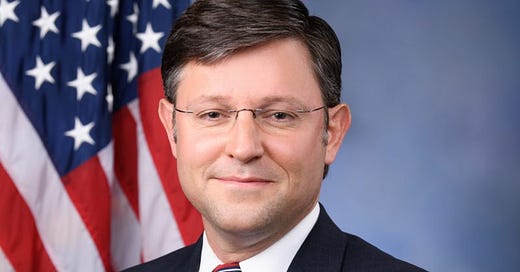



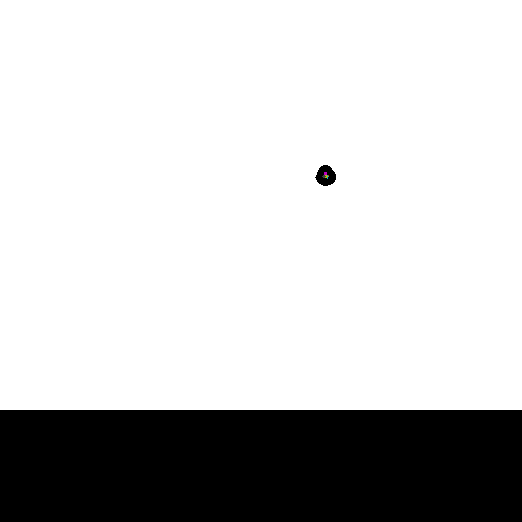
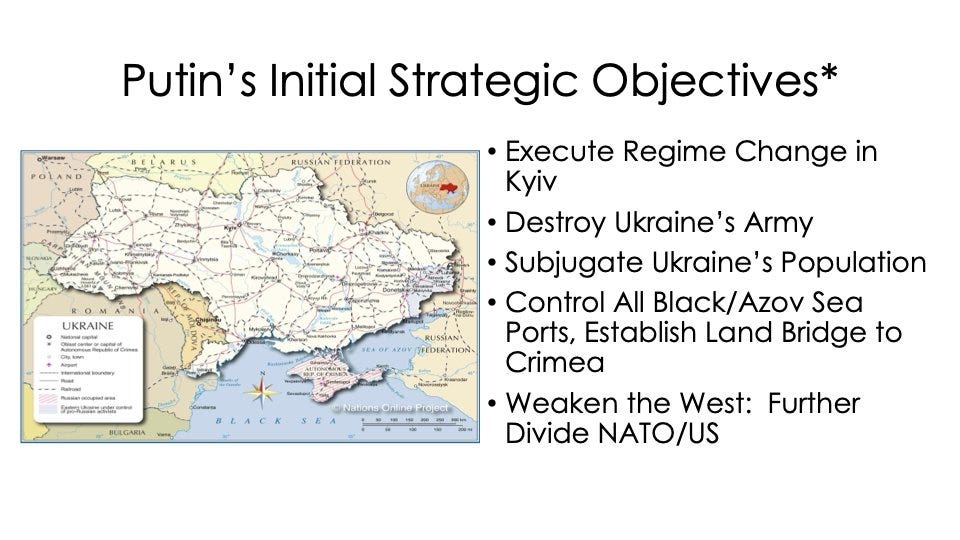

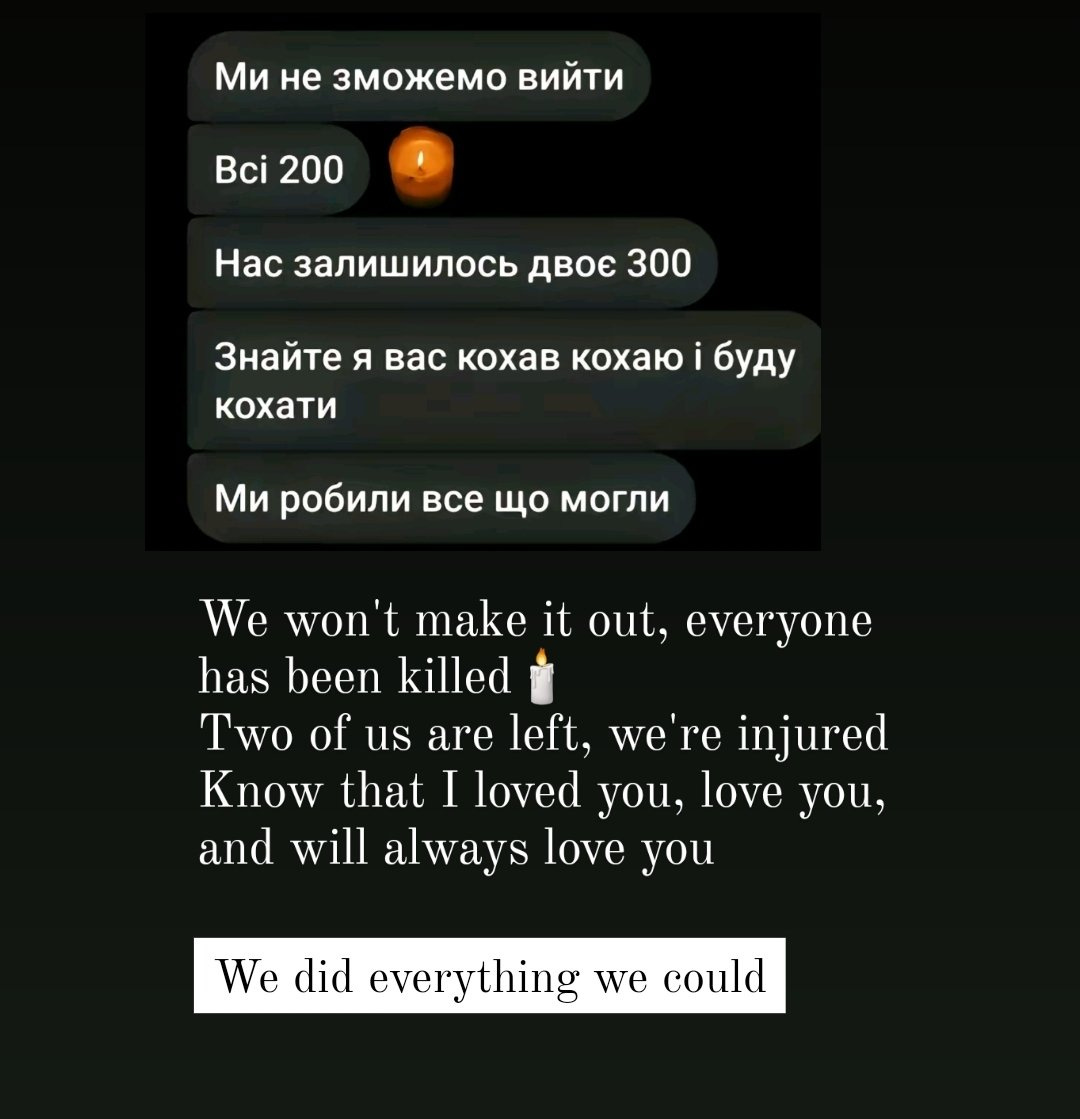

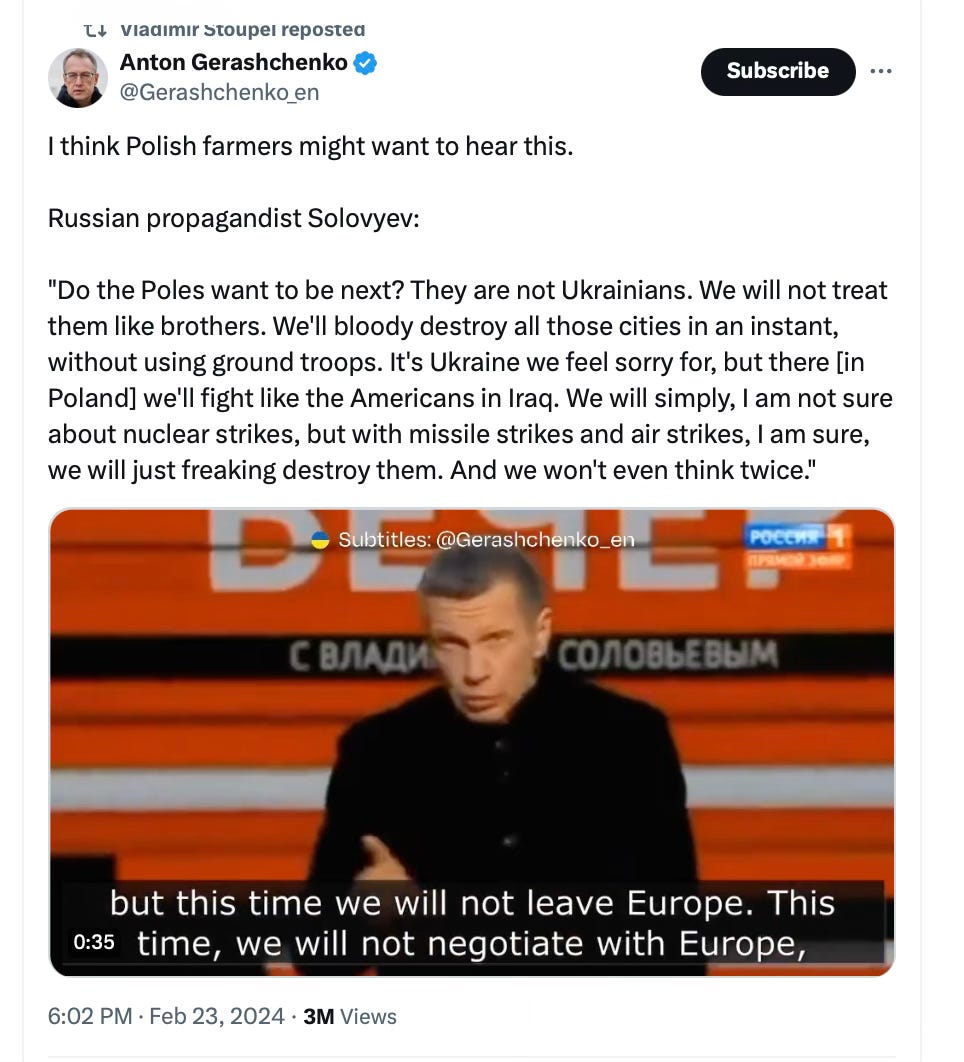

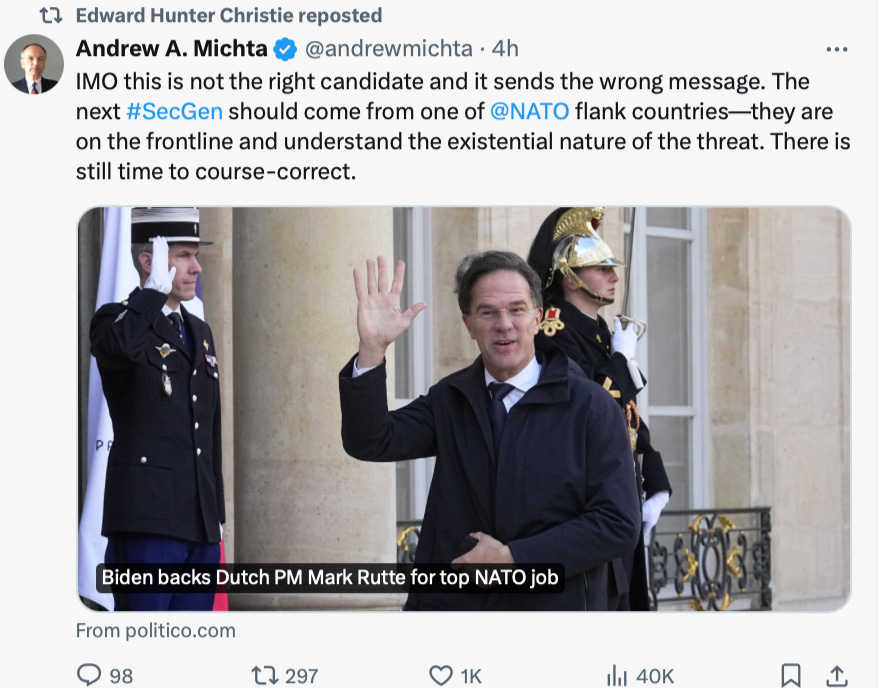
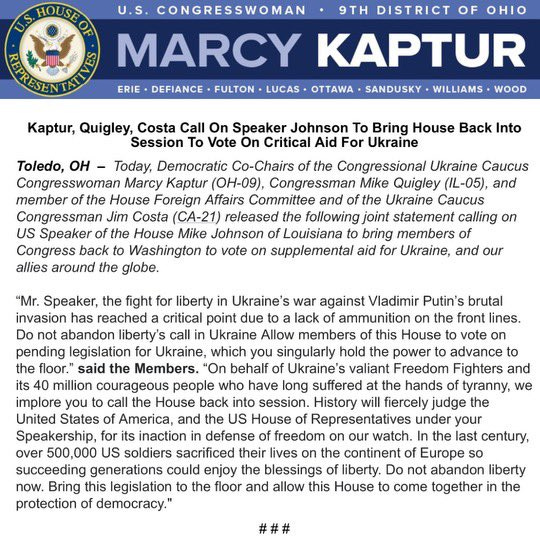
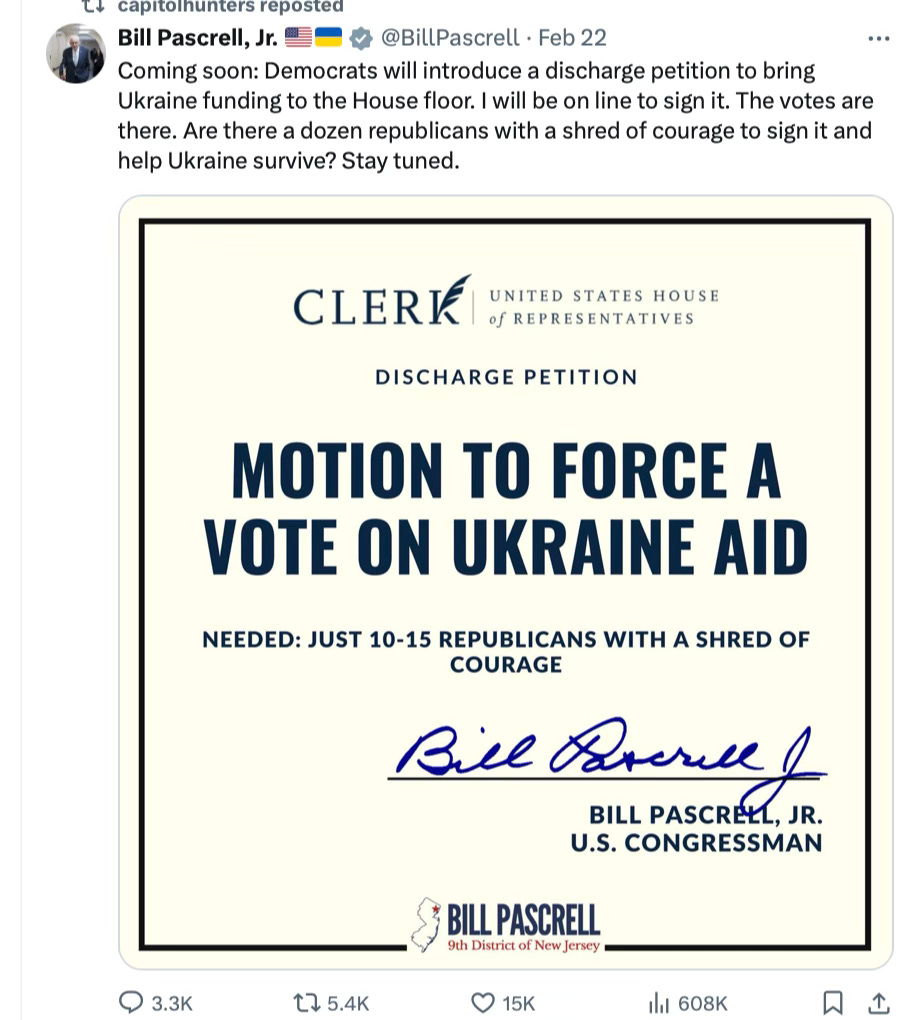
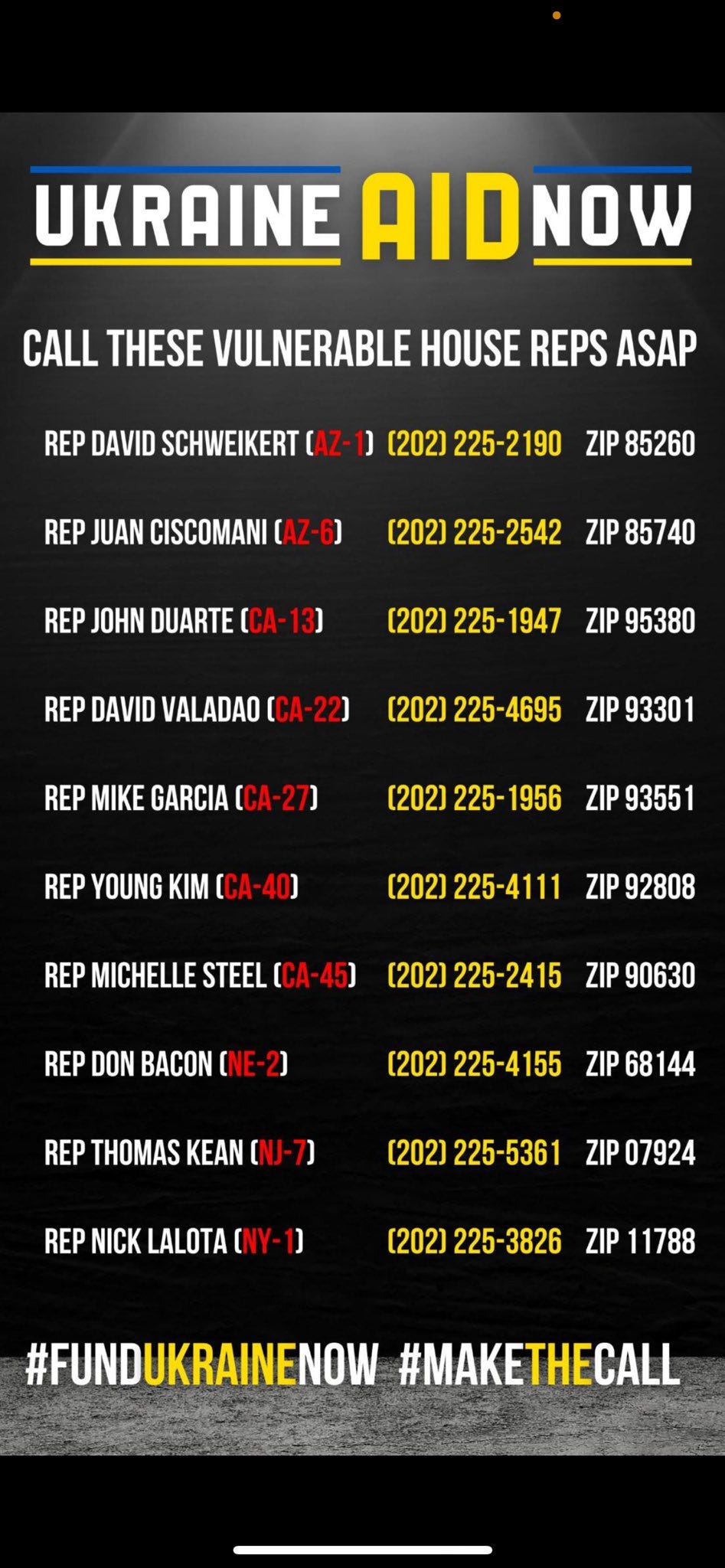

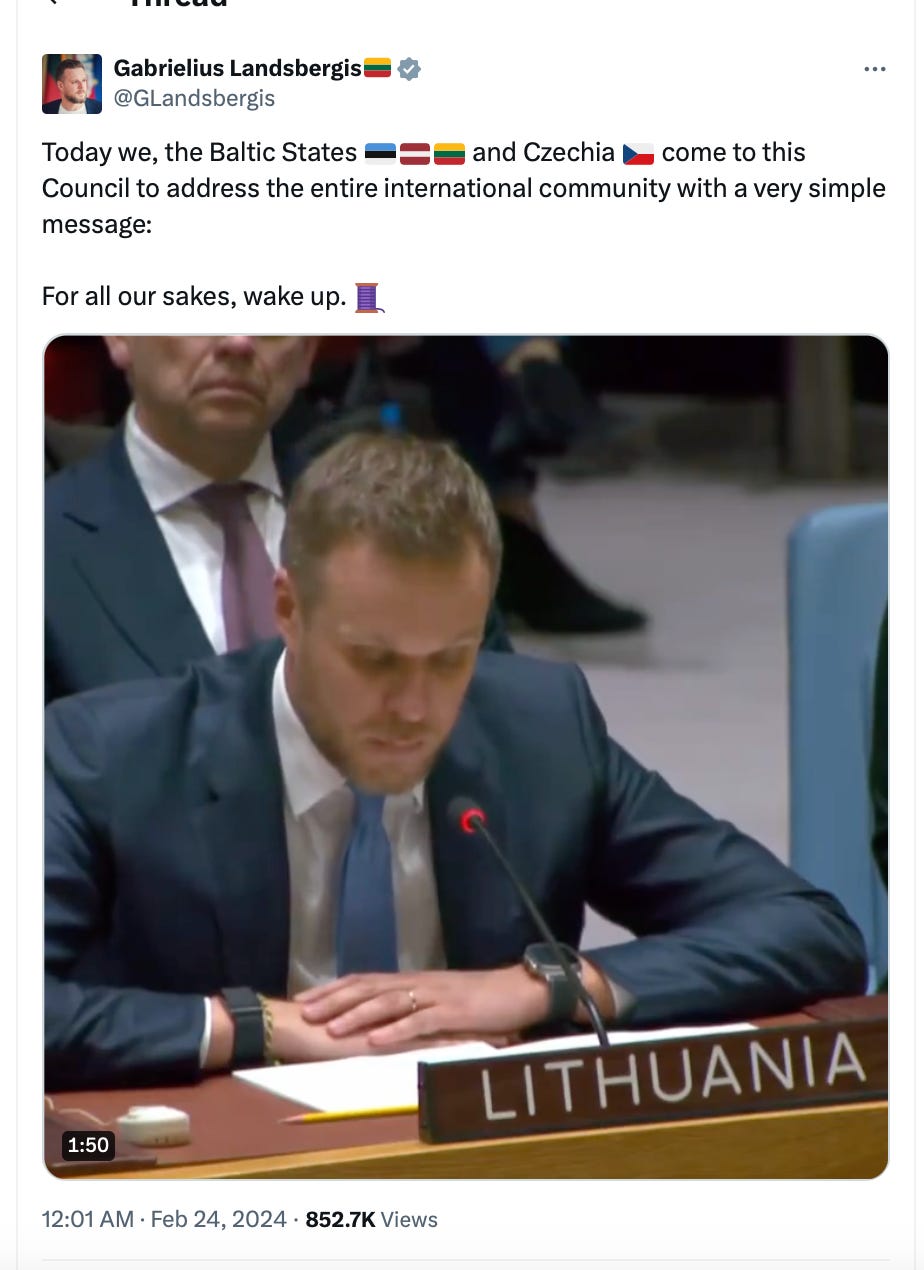

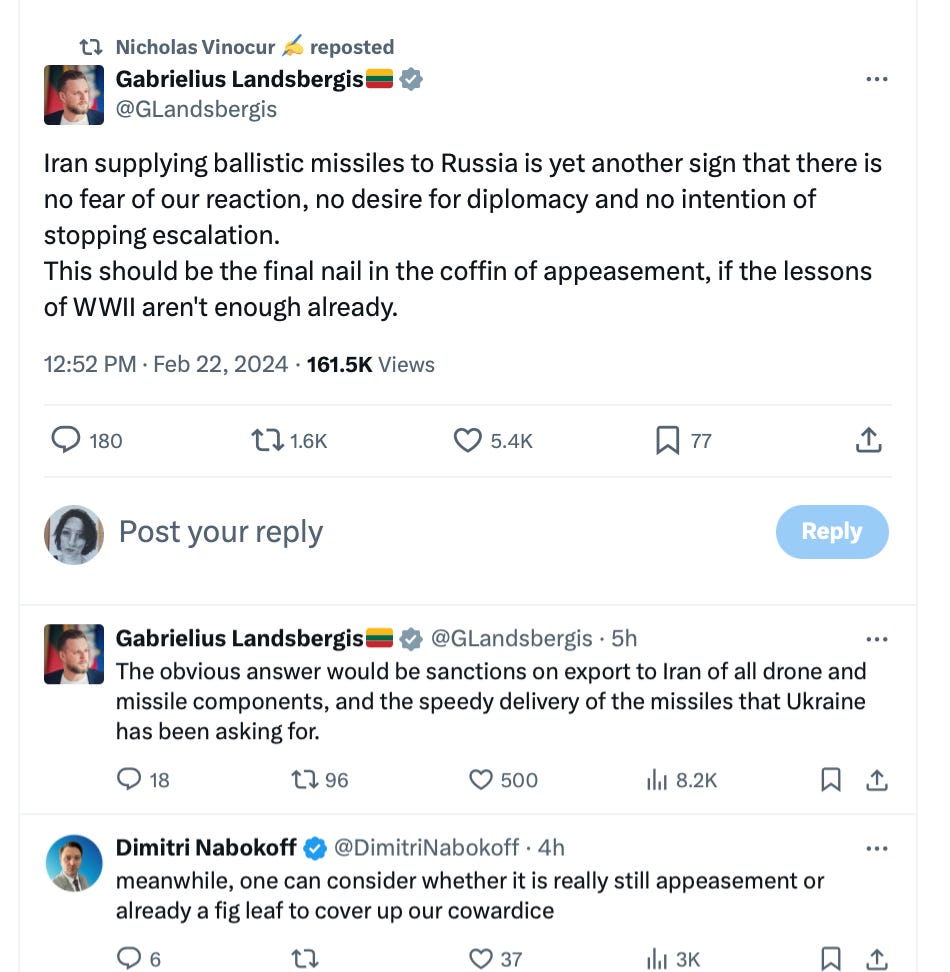
Claire you're really good! I suspect that I'm not alone in being overwhelmed by information about practically everything! I can't read all you write though I'd like to. What I'm hoping now is that the US will find a way around Mike Johnson to do what needs to be done with Ukraine and more - as you rightly say, the international rules based order is under attack. It's not just a Ukraine problem or even a European problem. It's global. Of course the order was largely constructed around US interests, but those interests were and are largely in everybody's interests and have proven adaptable to others - Kant's categorical imperative at work. Now the US in its Trumpian mode is acting against its own interests. The Trumpians, the Russians, the Hamasites and others have learned how to "flood the zone" as Bannon says and create doubt and division. Standing up to this turns out not to be easy. Brushfires on all sides coming together into a mighty conflagration.
Among the many depressing elements of this post, one stands out: "The former head of MI6, Sir Richard Dearlove, now has a podcast." Sigh.
I also like his restyling as Comrade Dearlov later on - a bit too young to be the Fifth Man, don't you think?